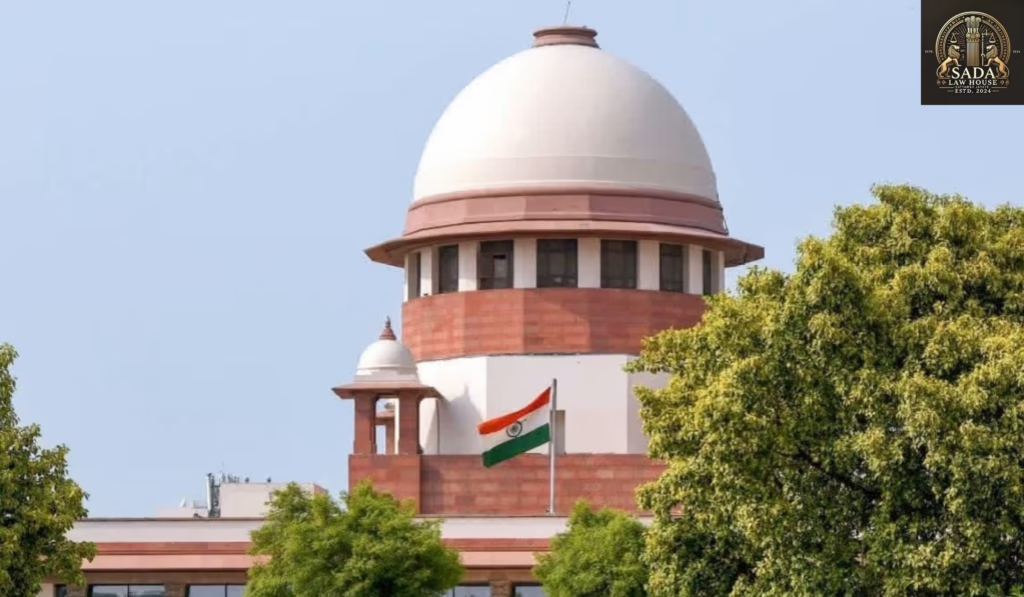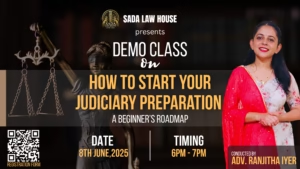Review Petition Challenges Supreme Court’s 3-Year Practice Rule for Judicial Services Entry
Trending Today Review Petition Challenges Supreme Court’s 3-Year Practice Rule for Judicial Services Entry INTERNSHIP OPPORTUNITY AT TRUEBLUE LEGALS, KANDIVALI OFFICE, MUMBAI JOB OPPORTUNITY AT ANOMA LEGAL LEGAL INTERNSHIP OPPORTUNITY AT PRANAY JOSHI ADVOCATE & ASSOCIATES LEGAL INTERNSHIP OPPORTUNITY AT VRG LEGAL Supreme Court Clarifies Res Judicata Principle Applies to Various Phases of Identical Proceedings LEGAL JOB OPPORTUNITY AT JADON LAW CHAMBERS Uttarakhand High Court Quashes Summons Against Patanjali and Baba Ramdev Over Misleading Ads Case LEGAL JOB OPPORTUNITY AT PINK SAMURA LEGAL JOB OPPORTUNITY AT AGROSTAR Review Petition Challenges Supreme Court’s 3-Year Practice Mandate for Judicial Service Eligibility PRABHAT KUMAR BILTORIA 17 June 2025 A review petition has challenged the Supreme Court’s mandate requiring three years of legal practice before candidates can apply for judicial service. The petition argues this decision is unfair, lacks empirical backing, and disproportionately affects marginalized communities. Supreme Court Ruling Sparks Legal Backlash The Supreme Court of India recently introduced a rule requiring three years of advocacy experience before applicants can be considered for entry-level judicial positions such as Civil Judge (Junior Division). A review petition has now been filed, challenging the immediate implementation of this mandate. The petitioner requests that the rule be deferred to 2027 to avoid disadvantaging law graduates from 2023 to 2025 who prepared under the previous eligibility framework. Violation of Constitutional Principles: Article 14 and Legitimate Expectation The review petition argues that the enforcement violates Article 14 of the Indian Constitution, which guarantees equality before the law. The petitioner claims the sudden enforcement causes retroactive hardship, contradicting the principle of legitimate expectation. This petition directly challenges the judgment delivered on May 20 in the All India Judges Association case by a bench comprising Chief Justice B.R. Gavai, Justice A.G. Masih, and Justice K. Vinod Chandran. Ignoring the Shetty Commission Recommendations According to the petitioner Chandra Sen Yadav, a practicing counsel, the court disregarded key recommendations from the Shetty Commission, which had advised eliminating the practice requirement. The Commission emphasized that internships and court visits during a law degree already offer practical exposure. Moreover, judicial candidates undergo training before assuming office, which the petitioner argues makes the three-year bar experience unnecessary. Selective Evidence from State Governments and High Courts The Court relied heavily on affidavits from various State Governments and High Courts supporting the rule’s reinstatement. However, the petition points out that opposing views from the states of Nagaland, Tripura, Punjab and Haryana High Court, and Chhattisgarh were overlooked. Absence of Empirical Data Supporting the Rule The petitioner criticizes the Court for basing its decision on anecdotal opinions rather than empirical research. No data was presented to prove that recent law graduates make ineffective judges. Historical data on the performance of candidates without bar experience was also not assessed. The petitioner asserts that such oversight renders the ruling arbitrary and unsubstantiated. Marginalized Groups Disproportionately Affected The petition highlights that the rule disproportionately impacts candidates from socially and economically underprivileged backgrounds, including Scheduled Castes (SCs), Scheduled Tribes (STs), and Other Backward Classes (OBCs). Additionally, law graduates with relevant legal experience in PSUs, corporate law firms, or as legal advisors are excluded because their roles do not qualify as “litigation practice.” Judiciary Overstepping Legislative Boundaries? Another major contention is that the Supreme Court acted as a policy-maker by enforcing a blanket eligibility rule across all states without legislative or consultative processes. According to the petitioner, this violates Article 141, which does not permit judicial overreach into policymaking. The restriction also contravenes Article 19(1)(g), which guarantees the right to practice any profession. Conclusion: A Call for Reconsideration The petition urges the Court to reconsider the 3-year experience requirement and delay its enforcement to protect the interests of recent graduates. It challenges the logic, fairness, and legality of the decision and calls for data-driven judicial policymaking. As the review is under consideration, the legal community and aspiring judges await a balanced and evidence-based resolution. Leave a Reply Cancel Reply Logged in as Sada Law. Edit your profile. Log out? Required fields are marked * Message* Live Cases Review Petition Challenges Supreme Court’s 3-Year Practice Rule for Judicial Services Entry Sada Law • June 17, 2025 • Live cases • No Comments Supreme Court Clarifies Res Judicata Principle Applies to Various Phases of Identical Proceedings Sada Law • June 16, 2025 • Live cases • No Comments Uttarakhand High Court Quashes Summons Against Patanjali and Baba Ramdev Over Misleading Ads Case Sada Law • June 16, 2025 • Live cases • No Comments 1 2 3 … 5 Next »


